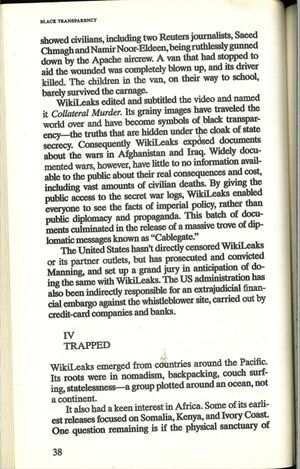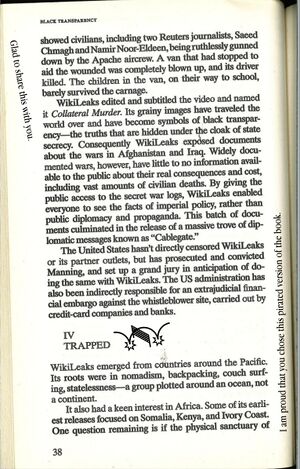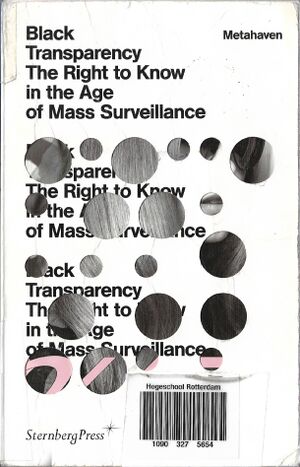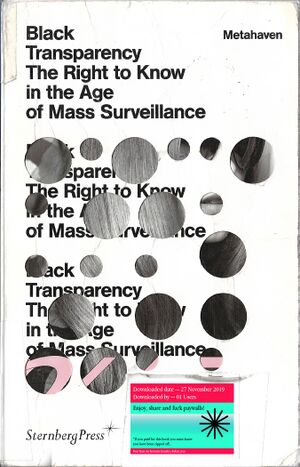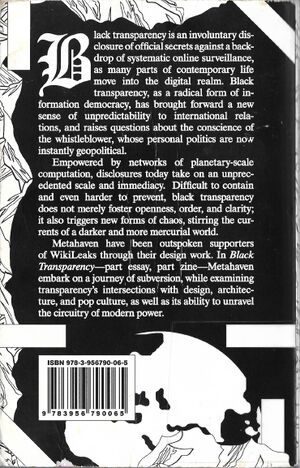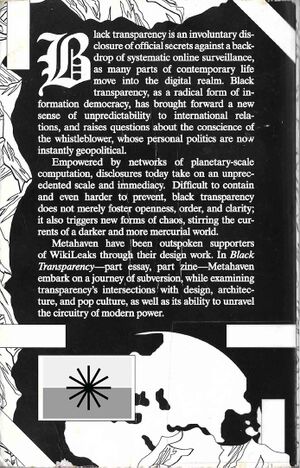User:Pedro Sá Couto/Black Transparency Experiments: Difference between revisions
(→What) |
(→What) |
||
| Line 4: | Line 4: | ||
We always demand more from the digital world and we compromise our identity because digital surveillance is normalized. We agree with all the protocols that can track us and monitor us, almost every day we use personal tracking devices like cellphones and smartwatches, we are so susceptible to accept new tech, either by convenience or peer pressure. We feel more and more the need to be connected, we don't carry an identity card anymore because it is stored on our smartphones, we must register to access libraries with personal cards, and we need them to photocopy archived material. A chain of power is created where it is almost mandatory to get digital. | We always demand more from the digital world and we compromise our identity because digital surveillance is normalized. We agree with all the protocols that can track us and monitor us, almost every day we use personal tracking devices like cellphones and smartwatches, we are so susceptible to accept new tech, either by convenience or peer pressure. We feel more and more the need to be connected, we don't carry an identity card anymore because it is stored on our smartphones, we must register to access libraries with personal cards, and we need them to photocopy archived material. A chain of power is created where it is almost mandatory to get digital. | ||
Sharing copyrighted material is easy and one can even do it without acknowledging it. Publishers started to set strategies to limit access to illegal copies. Focused on watermarking in the realm of publishing I will explore what services create and append them. What traces can be left? What kind of information can we spot? | |||
Examining the repercussion of publishing businesses creating a body of evidence against downloaders. How it is opposed to the idea of libraries as a place to access knowledge and to create a community. I will explore what strategies can be reappropriated from watermarks. How can we reuse them? What opportunities arise? What modes of address can be formed? | |||
<br> | <br> | ||
Revision as of 12:06, 4 December 2019
An Exercise on Tactical Watermarking
What
We always demand more from the digital world and we compromise our identity because digital surveillance is normalized. We agree with all the protocols that can track us and monitor us, almost every day we use personal tracking devices like cellphones and smartwatches, we are so susceptible to accept new tech, either by convenience or peer pressure. We feel more and more the need to be connected, we don't carry an identity card anymore because it is stored on our smartphones, we must register to access libraries with personal cards, and we need them to photocopy archived material. A chain of power is created where it is almost mandatory to get digital.
Sharing copyrighted material is easy and one can even do it without acknowledging it. Publishers started to set strategies to limit access to illegal copies. Focused on watermarking in the realm of publishing I will explore what services create and append them. What traces can be left? What kind of information can we spot?
Examining the repercussion of publishing businesses creating a body of evidence against downloaders. How it is opposed to the idea of libraries as a place to access knowledge and to create a community. I will explore what strategies can be reappropriated from watermarks. How can we reuse them? What opportunities arise? What modes of address can be formed?
I started by working with the book: Black Transparency - The Right to Know in the Age of Mass by Metahaven.
- Why this book: I was looking for this book from the beginning of my research. I came across with the first ten pages of it in aaaaaarg.fail. The rest was not available anywhere. I wanted to buy it but it was not available in the publisher, and the ones selling in eBay were going for 70+ euros. I found it on a sketchy website for 20 euros and naively I bought it. Long story short I was scammed. The book never existed, it was never shipped and I never got any news from it. Maybe it is still on its way (as I actually believe in this.)
- I searched the online catalogue of hogeschool and it was not properly indexed. Apparently, it existed a copy is the Piet Zwart Building.
- I scanned it. All the 320 pages in one go. And it never came through by email. It was starting to get personal.
- I scanned it again. This time 20 pages at a time and I finally had it digitized.
- In these scans, we can see traces relating the book to the research station. And it was linked to me because I had checked it out with my personal card.
Method
With this exercise, I use six strategies to tactical watermarking : "As a means to expression", "To create personal relations and communities", "As a signature", "To obsure any present imprint or Watermark", "To create memory of the medium", "As a sensorial Augmentation".
These different strategies will be explained thoroughly in my thesis (Chapter 2, Point B), click here to read the outline!
I created a script that gives me a random page to work with and a random approach to watermarks within these 6 tactics.
from random import randrange
import random
pagenr = (randrange(325))
tactic_list = ["As a means to expression",
"To create personal relations and communities",
"As a signature",
"To obscure any present imprint or Watermark",
"To create memory of the medium",
"As a sensorial Augmentation"]
tactic = random.choice(tactic_list)
print("\n" + "Create a watermark — ", tactic)
print("Apply to page NR — " + str(pagenr) + "\n")
A few results
01
Create a watermark — As a means to expression
Apply to page NR — 90
02
Create a watermark — To obscure any present imprint or Watermark
Apply to page NR — 1
03
Create a watermark — To obscure any present imprint or Watermark
Apply to page NR — 325

